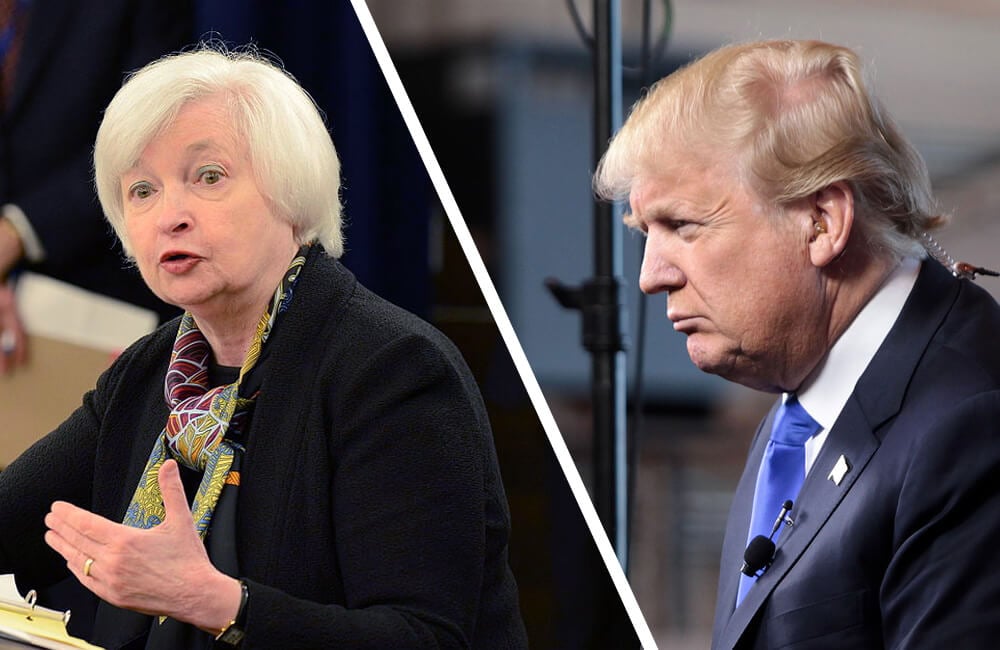They say it takes 21 days to form a habit. So what if you took eight years to build a habit?
That may be the situation that business owners face in 2017.
Eight years have passed since the Great Recession turned the economy on its head. And we’ve all grown accustomed to this economic environment of cheap money and stable prices.
So will you be ready if there’s a change? Because a closed-door meeting in December, that Trump is not invited to, could be the start of many changes to come for business owners.
The Story
On December 13th, Janet Yellen, Chair of the Federal Reserve, will meet with 11 other members of the Federal Open Market Committee. Behind closed doors, they will discuss whether or not to raise interest rates for the first time since last December — and only the second time since 2006.
And many Federal Reserve watchers, including Goldman Sachs, believe Janet Yellen will need to aggressively raise interest rates in 2017 to address Donald Trump’s policies.
This presents both opportunities and dilemmas to prepare for.
Key Details
Donald Trump plans to do a lot in his first 100 days, including cutting taxes while increasing military and infrastructure spending. All three objectives are generally thought of as economic stimulus because it puts money into the economy.
And with a Republican majority in the House and Senate, and infrastructure spending being popular with Democrats, it’s not unreasonable that all three objectives will become reality.
That may force Yellen’s hand on interest rates. Last Thursday, while testifying before a joint Congressional committee, Yellen cautioned against too much economic stimulus at a time when the economy is near full-employment.
The theory is that doing so would lead to high inflation. And the bond market tends to agree, as investors are dumping low-yield bonds that are unattractive in high inflation environments.
If inflation is kicked off, Fed Officials are expected to raise interest rates even faster than planned. And that is something business owners haven’t seen in more than a decade.
The Bigger Picture
Because we’re used to a low-interest rate environment, it’s important to adapt quickly when high interest rates finally come.
In the short term, the effects may be a plus for most business owners. Interest rate increases tend to go hand in hand with consumer optimism, and so customers spend more. Also, when interest rates start to rise there is often a rush to make purchases that require financing — so real estate, car and equipment sales may see a boost.
But in the long term, increased lending costs tend to spread throughout the economy, raising prices for everyone whether they borrow or not. For example, even if you’re not borrowing money, your suppliers might be, and they will have reason to charge more for their products and services.
Also, customers may find themselves paying more to interest than they have in the past, and that means less disposable income to spend on your business.
What To Do Next
Clearly higher interest rates are a mixed bag. On the one hand, they’re a sign that the economy is growing, and on the other hand, it’s an attempt by the Federal Reserve to temper the economy before inflation gets out of control.
The best thing to do is to prepare for the change. So here’s your 3-step action plan:
- Look for the right time to raise your prices. As inflation grows, and increased borrowing costs filter their way through the economy, it’s important to watch the margins in your business. If Trump’s policies do lead to inflation and higher interest rates, look for opportunities to raise your prices so that you can stay ahead of the curve.
- Build liquidity. Higher interest rates make having cash on hand more valuable. For one, you’ll earn a higher return in your savings account, and two, you’re less likely to have to borrow money at the higher rates. One of the best ways to build liquidity is with Cash Flow Banking.
- Avoid these 7 mistakes during the Trump transition. Last Thursday night, Garrett revealed the 7 mistakes most business owners will make during the Trump transition. If you haven’t watched the replay yet, set some time aside this weekend to watch and get more strategies for dealing with the changes coming in 2017.
That’s it for this week.
Build the life you love,
The Builders at Wealth Factory
What is Living Wealthy Weekly?
Each week we share timely trends, news stories, and current events that affect your life. We help you see the impact, personally and socially, and give you possible solutions to avoid any negative effects. We also give you additional links and resources if you want to investigate further. The purpose is not to be the last word on any topic. Rather it’s to help us all stay informed of what’s going on in the world without letting those events negatively impact your lifestyle. Our goal is to help us all live richer, fuller lives from a position of financial strength. This allows you to weather economic hard times, and seize whatever new opportunities arise in our changing world.


